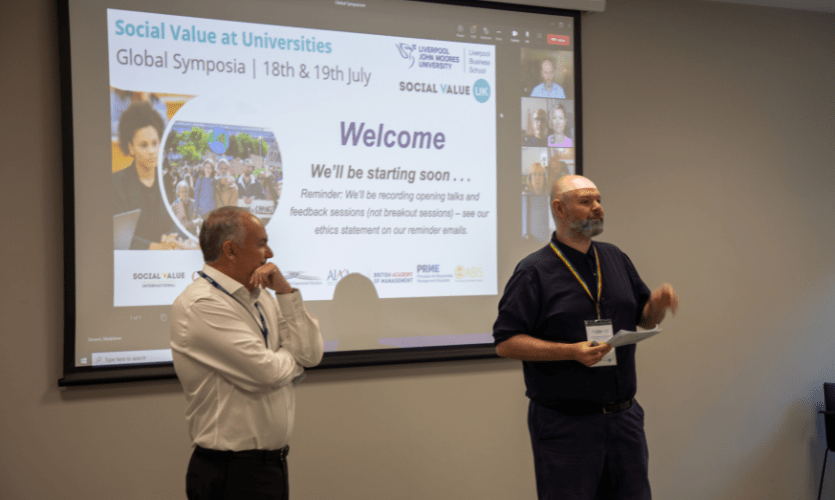Global symposium explores how universities and business schools can maximise social value

More than 130 people from 12 countries gathered in-person and online for a two-day global symposium hosted by Liverpool Business School and Social Value UK.
Bringing together students, academic staff and community organisations, discussions explored how universities, and in particular business schools, could maximise their social value potential and gain a wider perspective on the role they can play in creating a better environment for individuals, communities, and the planet.
Professor Tony Wall, from Liverpool Business School, and Crispen Sachikonye, CEO of Social Value UK, led the activities each day and LJMU’s Vice-Chancellor Professor Mark Power opened the sessions on day one. Dr Adam Shore, Director of the School of Business and Management, opened day two and concluded the symposia.
 Professor Wall said: “The symposia were catalysts for a social value movement, where we do more to drive positive change in communities in partnership. It recognised and built on the best of what we already do, and we will integrate the voices at the symposia to provide international guidance as a result.”
Professor Wall said: “The symposia were catalysts for a social value movement, where we do more to drive positive change in communities in partnership. It recognised and built on the best of what we already do, and we will integrate the voices at the symposia to provide international guidance as a result.”
Participants discussed how the work of universities, through their courses, projects and research, can affect change for students and local communities. They mapped out what universities already do well and where more could be done or perhaps stopped and undertaken in a different manner.
On day two, the focus switched specifically to business schools and the development of ways to integrate the principles and processes of social value methodology into curriculums across the globe.
From undergraduate and postgraduate modules to courses, business clinics, projects, and dissertations, the outcomes of the symposium’s discussions will help to inform new guidance to accelerate the introduction of social value in business schools.
Vicki Roskams, CEO of The Enbarr Foundation, said: “The event was an influential platform to show how important it is to listen to your stakeholders and allow them a voice to develop services and educational routes to support change mechanisms needed to help growth of both the individuals and their communities. I can already see this is inspiring the rapid development of new practices across the globe to not just promote social impact but through open collaboration, embrace it and share best practice.”
The outcomes of the discussions will underpin the work and launch of a new Academic Social Value Thought Leadership Group.
Crispen Sachikonye added that: “There are new social value career roles emerging; these outcomes may be an effective way to fill them and embed social value practice in organisations”.
Vice-chancellors, directors, academic and community regeneration experts in the UK and abroad have already reported changes to their practice and are seeking further collaboration for deeper impacts in their respective communities.
The event was supported by: British Academy of Management (Sustainable and Responsible Business SIG), Principles for Responsible Management Education (Working Group on Poverty), University Vocational Awards Council, Social Value International, The Academy of Business in Society, American International Accreditation Association for Schools and Colleges, and the National Society for Experiential Education.


